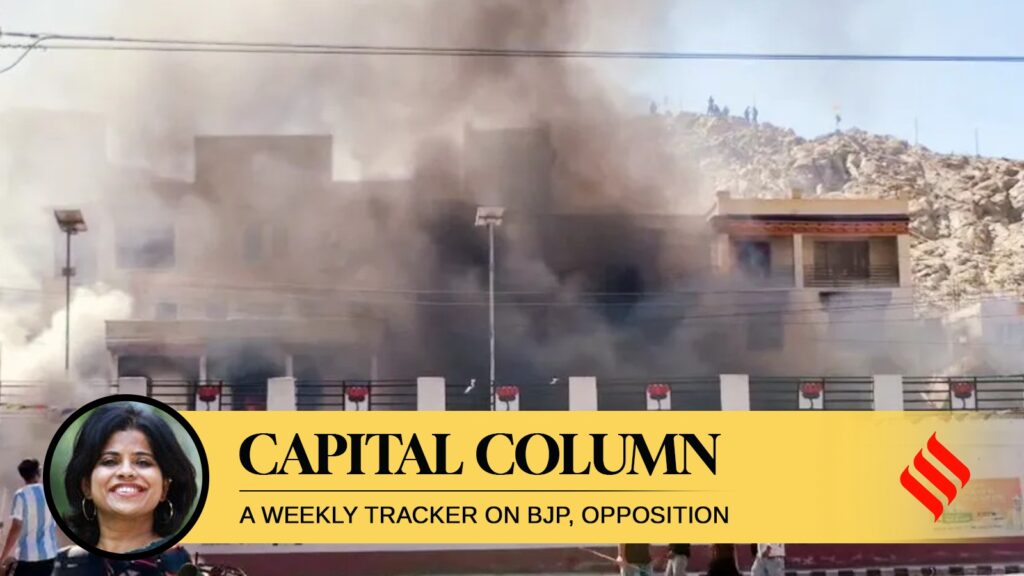LADAKH was one of the frontiers breached by the BJP coinciding with its rise around 2014. That year’s Lok Sabha elections saw the party get its first-ever MP from Ladakh, Jamyang Tsering Namgyal. The developments now come on the back of a consistent slide in those hard-won gains, including the BJP’s top leadership switching sides.
Party leaders who have seen the BJP’s fluctuating fortunes in Ladakh from close quarters express dismay, saying that not only has the party failed to “handle the situation sensitively” but also broken its promises to an electorate that had placed its faith in the BJP.
With Jammu and Kashmir, then including Ladakh, an ideological project of the Sangh Parivar, the RSS and BJP had wooed Leh away from the Congress by acknowledging its yearning for Union Territory and Hill Council status, and to emerge out of J&K’s shadow.
After the RSS supported the Ladakh Buddhist Association (LBA), several LBA leaders, including its chief Chering Dorje Lakruk and Thupstan Chhewang, had joined the BJP. While Chhewang is currently the Apex Body, Leh chairman, Lakruk is its co-chair.
On August 5, 2019, when J&K’s special status was revoked and the state split into two UTs, including Ladakh, the move was met with celebrations in Leh, with the LBA viewing it as the culmination of its long struggle.
However, now, Chhewang, Lakruk, and other former BJP allies have all parted ways with the party, and are the ones leading the campaign for statehood for Ladakh and its inclusion under the Sixth Schedule of the Constitution. The Sixth Schedule provides for the formation of Autonomous District Councils with legislative, judicial, and administrative autonomy within a state.
Several BJP leaders point out that the UT’s inclusion in the Sixth Schedule was a promise made by the party itself in several manifestos, as well as was a recommendation of the National Commission for Scheduled Tribes (NCST) under the Modi government.
A senior BJP leader said that having promised to extend the Sixth Schedule to Ladakh, the government should not have kept kicking the can down the road. “We cannot be seen as a party and a government that does not keep its promises. There has to be a reason for delaying the decision. We can always argue Kashmir is hostile, but what about Ladakh, a fragile but loyal frontier?”
Slamming the government, the leader said: “It is their arrogance that led to the September 24 violence in Leh. It is all messed up now.”
Nand Kumar Sai, who was the NCST chairman in 2019 when it recommended that Ladakh be included in the Sixth Schedule, said that had the suggestion been implemented, Ladakh would not have witnessed such violence. “The Commission took up the issue because of the huge demand for it. The Sixth Schedule status should have been granted by now,” Sai, a BJP leader and former Rajya Sabha MP, told The Indian Express.
On December 3, 2019, then Union Minister of State, Home, G Kishan Reddy had informed the Lok Sabha about the NCST’s recommendation. At the same time, Reddy had stressed that after the Ladakh Autonomous Hill Development Council (LAHDC) Act of 1997, and subsequent amendments, the powers of its councils “more or less” matched the Sixth Schedule benefits. “After the amendment of the LAHDC Act in 2018, these Councils are perhaps the most empowered Autonomous Hill Development Councils in the country,” Reddy said.
However, in 2020, when the Hill Council of Leh went to polls, the BJP itself promised constitutional safeguards under the Sixth Schedule. The party went on to win the polls.
In 2022 though, the Home Ministry did another flip, saying that the main objective of the Sixth Schedule, which was empowerment of tribal populations to ensure their socio-economic development, had already been met after the creation of the UT Administration of Ladakh.
The resentment against the Centre’s dilly-dallying means that the Buddhist-dominated Leh and Muslim-majority Kargil districts are united in their demands now. On the Kargil side, the Kargil Democratic Alliance has been leading the protests.
At least three leaders The Indian Express spoke to also questioned the arrest of environment activist Sonam Wangchuk. Calling the reason for it “unconvincing”, a leader said: “Till a few months back, the party itself was making social media reels on him. Now he has been arrested under the National Security Act (NSA).” Wangchuk, who was himself a vocal supporter of the Modi government, has been accused by the Union Home Ministry of “instigating” the violence, with allegations made about his “links” with Pakistan.
Soon after his arrest under the NSA, he was flown in haste to Jodhpur.
Sai said all this means that a lot of water has flown under the bridge since 2019. “Many things have gone out of control. The Centre should hold discussions with all the stakeholders, and a probe should be conducted into how the September 24 protests became violent.” He added that he was not ruling out the involvement of “some external forces”. “There should be an investigation into who inspired such protests, whether Sonam Wangchuk has come under the influence of external forces.”
However, Sai said, “things should not have reached this level”, and said it was high time a solution was found.

